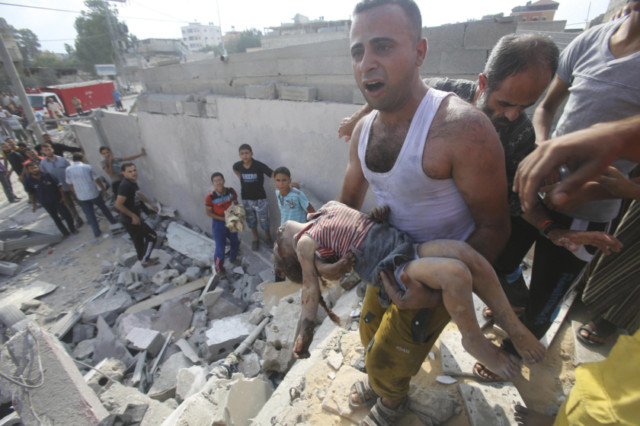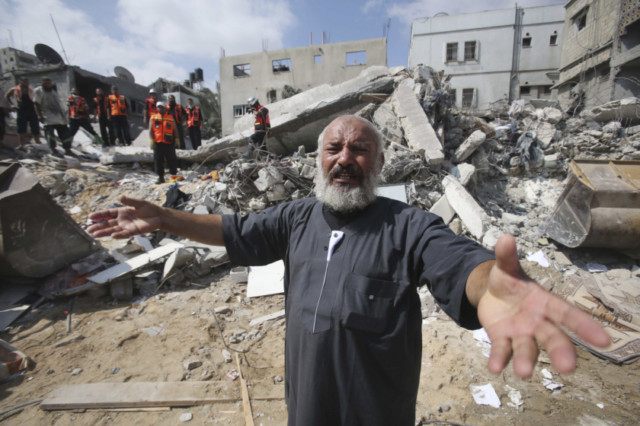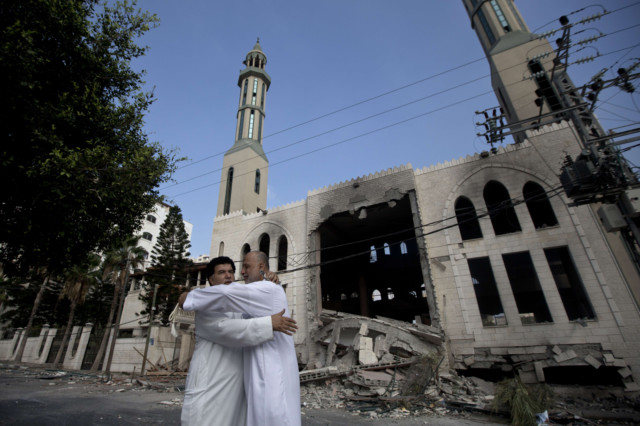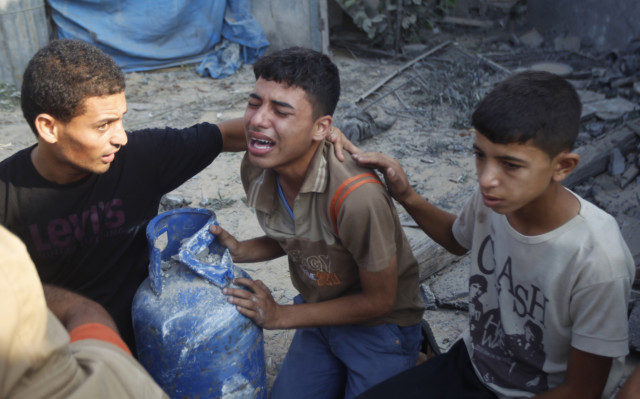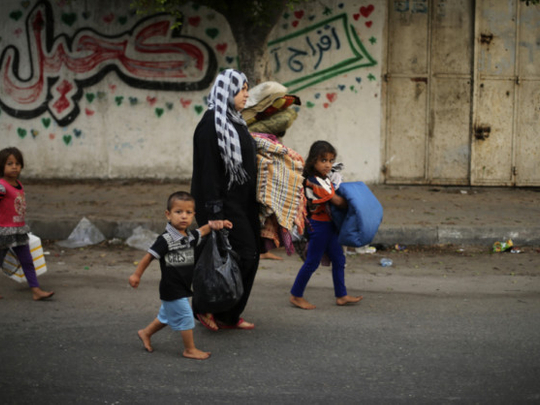
Gaza Inside Shifa Hospital, amid the tumultuous rush to save lives, men pushed a gurney carrying the lifeless body of a child wrapped in a sheet. A girl in a red dress, her face covered with blood, walked in a daze past the dead and the nearly dead.
“Oh my God, what happened to us?” a man screamed, his voice somehow lifting above the din of hundreds of people who clogged the hospital’s halls on Monday. They were all perhaps asking the same question.
The tragedy began on Monday around 4:30 p.m. with an explosion on a narrow, tree-lined street in the Beach Camp neighborhood. Muslims were celebrating the holiday of Eid Al Fitr, and children were playing outside - some on swings, some near storefronts and parked cars. Hamas militants blamed an Israeli airstrike. Ten residents were killed, including at least seven children.
At 5 p.m., Ahmad Al Helou was not thinking of blame, at least not yet. He was at the hospital, crying in front of his father’s shattered corpse, a headless tangle of flesh and bone. He didn’t notice the dead child in the sheet or the dazed girl in red passing by.
A week ago, the family home came under fire in the city’s Shijaiyah enclave, where Israeli forces and Hamas militants fiercely clashed. Helou’s grandmother - his father’s mother - was killed in the crossfire, and the family fled to Beach Camp. The three-week-old war found them there.
“My beloved father,” Helou’s brother cried, standing at his white, blood-drained feet. “You are following your mother.”
Moments later, the two men helped nurses place their father’s corpse in a white bag. A small piece of his body fell to the floor. Ahmad picked it up, unzipped the bag and carefully tucked it inside.
Outside the hospital’s morgue, Saleh Eleyan sat on a step, his head buried in his palms. The bodies of his two sons were inside. A hospital worker came by and asked him to confirm their names, written on a sheet of paper. Afterward, silent and sobbing, Eleyan spotted a boy who resembled his sons - and hugged him hard.
An ambulance rolled by slowly. Some people peered into the back to see if a relative was inside. A hospital worker pushed an empty gurney, covered with a pool of blood, from the morgue.
Inside the morgue, the bodies of five children were stacked in a metal freezer - two on the top rack, two in the middle and one on the bottom. Scores of angry men denounced the killings.
“It’s the martyr’s Eid,” yelled one.
“We will not be afraid anymore of the Israelis,” yelled another.
“May Allah take revenge for this,” they all chanted a few minutes later.
At 6:15 p.m., hundreds of people were gathered in Beach Camp, on the street where the explosion occurred. There was a small crater in the asphalt. Buildings and a white Mitsubishi sedan were pocked with baseball-size shrapnel holes. Two torn children’s slippers lay in a pool of blood.
Yahya Al Derby, 10, remembered how he was playing with his friends on the swing set, a portable contraption set up to entertain children during Eid. He had felt tired and had gone to his house. The other children, residents said, were either on the swings or in the street when the shell or rocket struck.
“Most of them are my friends,” Derby said, his hands shaking.
As he spoke, a woman approached. She was looking for her sister-in-law’s son, Osama. He was playing on the swings, she said. When asked her last name, she said it was Al Helou. She wasn’t aware that Osama’s grandfather - Ahmad’s father - had been killed. And no one had the courage to tell her.
At 6:48 pm, the men of Beach Camp carried the body of 9-year-old Mansour Hajaj to the nearby cemetery. It was opposite a house that had been reduced to rubble three days earlier by an Israeli airstrike, residents said. A portion of the cemetery was also destroyed.
As per Muslim tradition, Mansour’s body was washed and shrouded in white cloth. His uncle, a medic, was used to dealing with corpses. But when he carried his nephew, he was sobbing uncontrollably.
The boy’s father, Rami, was in worse shape, unable to help bury his son. But as the uncle placed Mansour into his final resting place, his father cried out: “I want to see him.”
The uncle lifted Mansour and opened the shroud, revealing his black hair. His father bent down and kissed his son’s head.
“May Allah take revenge for this,” the mourners chanted, after Mansour was laid to rest.
By 7:10 pm, they had filtered out of the cemetery.
“He wanted to chase happiness on Eid,” Rami Hajaj said, glancing upward as if he was speaking to the heavens. “He was just a kid.”


